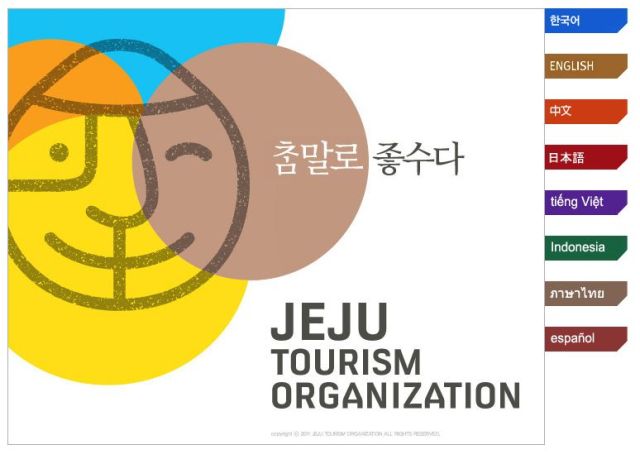| |
 |
|
| ▲ Jeju Tourism Organization |
Planning a vacation can be daunting, but today’s technology means we can see pictures, hear tales, make reservations, and map out a course of travel all from the palm of our hands.
In such high-tech times, information is boundless yet the heaps of tourism websites, blogs, Twitter, and Facebook pages make combing through the endless possibilities a terrifying task. Even once you decide on where to go, you then have to decide on which museums to visit, landmarks to see, and restaurants to eat at.
Visiting Jeju Island is no exception. Korea’s prime holiday island and New7Wonder of the World is becoming increasingly popular among foreign tourists. Containing numerous scenic destinations, outdoor activities, festivals, and museums, one could spend a week exploring and not even scratch the surface of what Jeju has to offer. But, how to decide what to do?
Tourism websites are still a force in the vacation-planning ring, but they seem to quickly be losing ground to personal blogs and word-of-fingertip that spreads through social media. Why is this?
Jeju Island has two official tourism sites: the Jeju Tourism Organiziation (JTO) site (www.ijto.or.kr) and the Jeju Special Self-Governing Provincial Tourism Association (JTA) site (www.hijeju.or.kr). Both provide information about what is available on the island of wind, rocks, and women, and with eye-catching photos of the island’s most beautiful scenes, they catch the attention of would-be tourists. However, do they meet all the right criteria?
Multi-language options are a must and ease of browsing is just as important, with clear displays and also in-depth information. Tourists want to be introduced to an area, told what makes it unique, exciting, and a must-visit destination. Once interest is sparked, there has to be a hook - too much clutter, or too little information, and you quickly click on.
| |
 |
|
| ▲ Jeju Tourism Association |
The JTO and JTA websites make a great start to most of these criteria. Both websites offer a variety of language options - JTO even offers eight languages, from Thai to Spanish - which helps in making Jeju accessible to international vacationers. Additionally, the websites are fairly well organized, clean, and easy to navigate. Bold headings, clear writing, and easily scanned information truly make the websites accessible to everyone. So, why do these websites ultimately fall short?
The biggest downfall is simply the content. Both websites focus primarily on the history of Jeju, the traditions of Jeju, or the industry of Jeju. The JTO even has great sections devoted to Jeju’s myths, folk rituals, and traditional food, lodging and clothing. Don’t get me wrong, all of these are important, but the websites are missing a lot of the ‘here and now,’ such as where to go, and how they to get there.
The JTA website does at least introduce the “Variety of Jeju,” such as festivals and tours around the island – a step up from the JTO’s sparse sightseeing information. Potential vacationers can see a plethora of places to visit and it would be easy to create an itinerary of where to go during their stay.
The issue with the JTA website lies with the lack of information about where these places actually are – aside from a dot on a small outline of the Jeju and the nearest main road number. There are no addresses, no bus routes - nothing to aid the traveler in exploring on their own. The JTO website also offers no information on transportation - except for how to get here in the first place - leaving travelers on their own to find places to see, stay, and eat. Additionally the outdated information on the JTO website (the last community notice about a festival is dated 2011!) makes viewers quickly search for more current information.
And where do we find the most current information? Social media. In such a high tech society filled with iPads, smart phones, and Wi-Fi hotspots in every coffee shop, it is second nature to scroll through blogs or Facebook pages full of information about your potential travel destinations. Tourism websites are falling behind this surge in social media, but will they die out completely, or can some rearranging, revamping, and restructuring restore their place in the world of tourism?
Only time will tell.
|





















